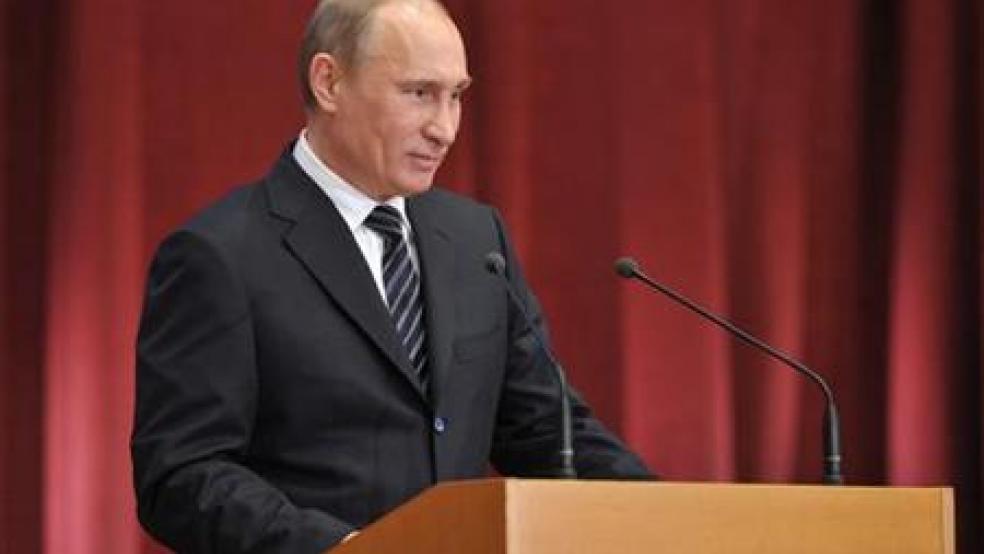MOSCOW (Reuters) - President-elect Vladimir Putin tried to distance himself from the fraud-tainted ruling United Russia party on Tuesday, announcing he was stepping down as its chairman and calling on it to be more competitive.
Keen to protect his own ratings which are higher than those of a party discredited by accusations of fraud in its parliamentary election victory in December, Putin proposed outgoing President Dmitry Medvedev as its new leader instead.
"In line with political practice here, the president stands above parties," Putin told the leadership of United Russia, describing the head of state as "a consolidating figure for all political forces in the country".
"In this regard, after the inauguration in May I deem it necessary to step down as chairman," Putin said.
The prime minister, who will be sworn in as president on May 7, suggested that a party congress in the second half of May should elect Medvedev as the new chairman.
Putin, 59, has also said that Medvedev, a longtime ally who led United Russia's campaign in the December election to the Duma, the lower house of parliament, will become prime minister.
"Since Dmitry Anatolyevich led the party in the State Duma election campaign, and since I will recommend him for the post of prime minister, I believe it is right for him to head the party as well," Putin said.
"It is a global practice that the government leans on the support of the parliamentary majority."
The move could be a poisoned chalice for Medvedev, however, whose popularity has dropped since he and Putin announced last September that he would step down as president and make way for Putin's return to the Kremlin.
Medvedev is less popular than Putin among party members, many of whom blame him for the relatively poor showing in December's election and view him as too liberal.
FREEDOM FOR EVERYBODY
In a speech in the Kremlin earlier on Tuesday, one of his last public appearances as president, Medvedev emphasized his adherence to liberal and free market values.
"I will repeat what I said in May 2008 upon assuming the presidency: I consider the development of civil and economic freedoms is my most important task. More freedom for each person - that was and remains my goal," Medvedev said.
In the speech, which broadly outlined his agenda as head of government, Medvedev promised to reduce the role of the state in the economy, privatize state-controlled assets and grant more fiscal powers to Russia's regions.
"State companies should stop acquiring private firms and start selling non-core assets," Medvedev said in a veiled reference to state-controlled behemoths like Gazprom, where he long served as board chairman.
Such an agenda was not likely to strike a chord with the majority of United Russia members who espouse more leftist and populist views, favoring a greater role of the state in the economy.
Some cautiously asked for Putin's permission to oppose the new government on policy issues, arguing that the party should be more aggressive in the political atmosphere changed by the biggest opposition protests of Putin's rule.
"Taking into account the new goals ahead, changes in the political landscape, maybe it is necessary for us to take a tougher line towards the (government)?" parliament member Alexander Khinshtein asked Putin.
"What do you think, should United Russia have a greater influence on the process of the cabinet's formation, and in the future on rotation of the cabinet ministers?" said Sergei Ilyinykh, party leader in the Siberian city of Tomsk.
Putin said he hoped for constructive cooperation between United Russia and the new government, whose lineup is expected to be announced in the second half of May.
"The party should be more viable, more politically competitive, if it is to remain in the race for leadership," Putin said. He and Medvedev are currently engaged in secretive consultations over the new cabinet's lineup.
United Russia won just under 50 percent of the votes cast in the Duma election on December 4, down from more than 64 percent in the previous poll in 2007. It rejects the fraud allegations, which triggered large protests against the party and Putin.
Putin won more than 63 percent of votes in the presidential election on March 4, and his opinion poll ratings have long been much higher than the party's.
(Editing by Timothy Heritage and Myra MacDonald)


